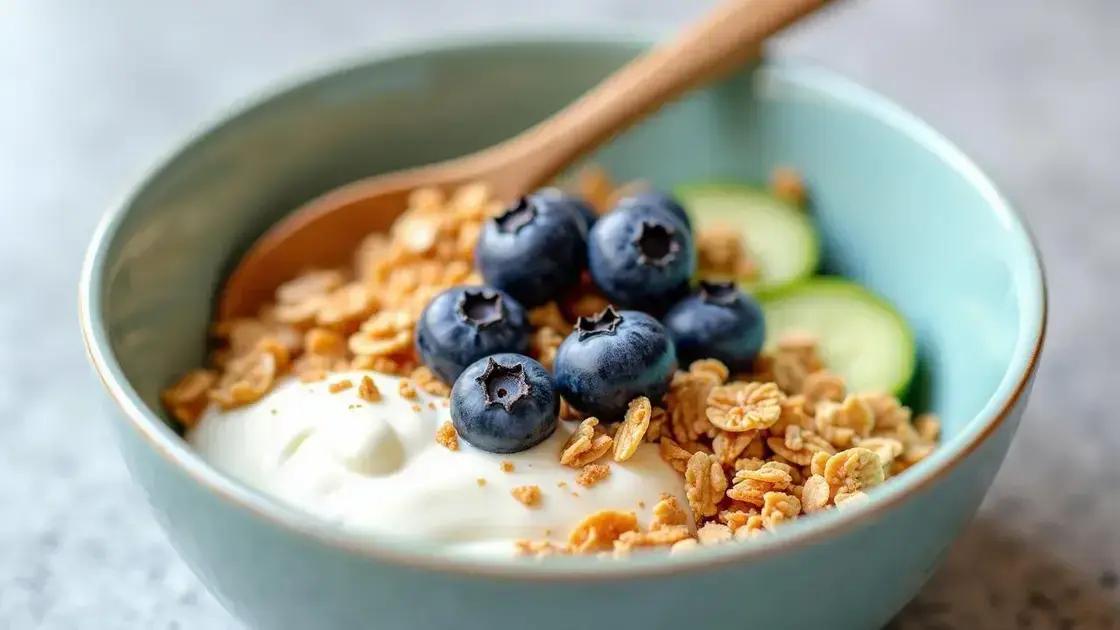Incorporating blueberries into your diet can significantly enhance cognitive health due to their high levels of antioxidants, which protect brain cells, improve memory, and reduce cognitive decline. Pairing blueberries with other brain-healthy foods like leafy greens, fatty fish, and nuts can further support overall brain function.
Wondering how to safeguard cognitive health with blueberry consumption? This delightful fruit isn’t just tasty; it’s a powerhouse of nutrients that can enhance brain function and protect against cognitive decline. In this article, we’ll explore the remarkable benefits of blueberries, the science behind their impact on brain health, and how you can easily include them in your daily diet for optimal cognitive wellness.
The Nutritional Benefits of Blueberries

Blueberries are not just delicious but also packed with essential nutrients. These little berries are rich in vitamins, minerals, and antioxidants that contribute to overall health. Vitamin C is abundant in blueberries, which helps with the body’s immune function. It also plays a role in collagen production, essential for healthy skin and connective tissue.
Antioxidant Power
One of the remarkable benefits of blueberries is their high level of antioxidants, particularly flavonoids. Antioxidants help combat free radicals in the body, which can lead to oxidative stress and cell damage. Studies have shown that the antioxidants in blueberries may reduce inflammation and protect against chronic diseases.
Fiber Content
Blueberries are a great source of dietary fiber. Fiber is crucial for digestive health as it helps maintain regular bowel movements and supports gut health. Additionally, a diet rich in fiber can help manage weight and lower cholesterol levels.
Heart Health
Research indicates that consuming blueberries may contribute to heart health. The nutrients found in blueberries can improve blood pressure and cholesterol levels. Moreover, their anti-inflammatory properties can reduce the risk of heart disease.
Incorporating blueberries into your diet can offer numerous health benefits, making them a smart choice for those looking to improve their overall well-being and cognitive health.
How Blueberries Affect Brain Health

Blueberries have a significant impact on brain health. The compounds found in blueberries, especially their high levels of antioxidants, play a vital role in supporting cognitive functions. Studies suggest that these compounds may enhance communication between brain cells, improving memory and overall cognitive performance.
Protecting the Brain
Research indicates that blueberries can help protect the brain from oxidative stress. By reducing inflammation and fighting oxidative damage, blueberries may slow down age-related decline in brain function. This means they can be beneficial for keeping your mind sharp as you age.
Enhancing Memory
In various studies, participants who consumed blueberries showed improvements in memory and learning. This effect seems to be due to the antioxidants and phytochemicals that boost brain health. They enhance both short-term and long-term memory, making blueberries a great addition for those wanting to support their cognitive abilities.
Improving Mood
Blueberries may also positively affect mood and mental health. The nutrients in blueberries can help reduce symptoms of anxiety and depression. A study found that individuals who ate blueberries regularly reported feeling more positive and had reduced feelings of stress.
By incorporating blueberries into your diet, you can harness these brain-boosting benefits and support your overall cognitive health.
Incorporating Blueberries into Your Diet

Incorporating blueberries into your diet can be both easy and enjoyable. These sweet fruits can be added to a variety of meals and snacks throughout the day. Here are some delicious ways to include blueberries in your meals:
Breakfast
Add a handful of fresh blueberries to your morning cereal or oatmeal. They can also be blended into smoothies for a nutritious boost. Try mixing blueberries with yogurt for a quick and healthy breakfast.
Snacks
Blueberries make for a perfect snack. Enjoy them fresh, or try freezing them for a refreshing treat. You can also make a blueberry dip by mixing cream cheese with a little honey!
Salads
For lunch, enhance your salads with blueberries. They pair well with leafy greens, nuts, and feta cheese. A simple dressing of balsamic vinaigrette also complements their sweetness beautifully.
Desserts
Blueberries can be used in various dishes, such as muffins, pies, or fruit tarts. Baking with blueberries adds sweetness and nutrients to your desserts. You can also blend them into a sauce to drizzle over ice cream or pancakes.
By trying these different methods, you can easily add blueberries to your diet and enjoy their numerous health benefits!
Other Foods for Cognitive Health

While blueberries are excellent for cognitive health, many other foods can also support brain function. Including a variety of these foods in your diet lets you take full advantage of their benefits. Here are some top choices:
Leafy Greens
Vegetables like spinach and kale are rich in vitamins and minerals. They contain antioxidants that help protect brain cells and may reduce cognitive decline.
Fatty Fish
Fatty fish, such as salmon and mackerel, are high in omega-3 fatty acids. These healthy fats are vital for brain health, improving mood and enhancing memory. Aim for two servings of fatty fish each week.
Nuts and Seeds
Nuts, like walnuts and almonds, are packed with nutrients. They provide healthy fats, antioxidants, and vitamin E, which are believed to support brain health and mental clarity.
Whole Grains
Whole grains, including oats and quinoa, are great sources of fiber and nutrients. They help maintain stable blood sugar levels, boosting your energy and concentration.
By adding these foods to your diet alongside blueberries, you can create a balanced approach to enhancing cognitive health.
In summary, safeguarding cognitive health is within reach
Incorporating blueberries and other nutritious foods into your diet can enhance brain function and overall well-being. Blueberries stand out as a superfood due to their rich supply of antioxidants and cognitive benefits, making them an ideal choice for anyone looking to boost mental clarity and memory.
By combining blueberries with other brain-healthy options such as leafy greens, fatty fish, nuts, and whole grains, you can create a well-rounded diet that supports cognitive health. Small changes in your eating habits can lead to significant improvements over time.
Remember, adopting these healthy foods into your meals is a delicious and effective approach to maintaining and enhancing cognitive function as you age.
FAQ – Frequently Asked Questions about Safeguarding Cognitive Health with Blueberries
What are the main benefits of blueberries for brain health?
Blueberries are rich in antioxidants that help protect brain cells, improve memory, and may reduce cognitive decline as you age.
How can I incorporate blueberries into my diet?
You can add blueberries to your breakfast cereal, smoothies, salads, or enjoy them as a healthy snack. They are also delicious in baked goods.
Are there other foods that support cognitive health besides blueberries?
Yes, foods like leafy greens, fatty fish, nuts, and whole grains are also great for promoting brain health and function.
How often should I eat blueberries for optimal benefits?
Including a handful of blueberries several times a week is beneficial. Aim to make them a regular part of your healthy diet.
Can blueberries help improve my mood?
Yes, studies suggest that the nutrients in blueberries can help reduce symptoms of anxiety and depression, improving overall mood.
Do I have to eat fresh blueberries, or are frozen ones just as good?
Frozen blueberries retain most of their nutrients and can be just as beneficial as fresh ones. They are convenient and can be used in various recipes.













